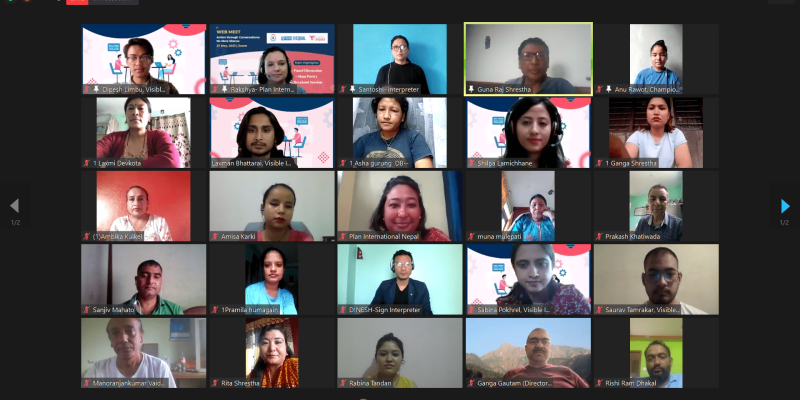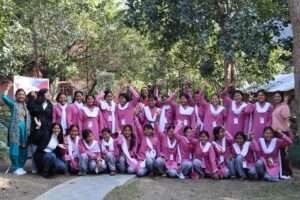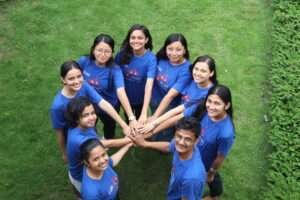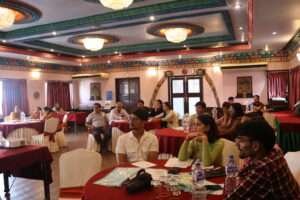Year: 2021
Supported by: Plan International Nepal Girls Get Equal
Major component: advocacy, gender equality, menstrual health management, young people
Introduction
Visible Impact has been celebrating menstrual hygiene day every year by conducting different programs to advocate safer and healtheir menstruation. This year on 28th May 2021 marking menstrual hygiene day, Visible Impact organized a week long social media campaign and web meet through social media platforms due to the restrictions of COVID-19 pandemic.
Major activities under MHD 2021
ICreate! Contest
ICreate contest is a medium of celebrating menstruation through creation marking Menstrual Hygiene Day 2021. The postcards were shared through the Facebook and Instagram pages of Visible Impact. A total of 47 entries were received. The postcards had empowering messages and showcased the creativity of the participants.
MH Day Profile Frame Sharing Contest
A profile frame with the theme of Menstrual Hygiene Day, 2021-More action & investment in menstrual health & hygiene! was created. To participate in the contest, people had to download the frame and share it in their profile pictures and write a meaningful caption on menstruation by tagging Visible Impact. Besides the participants of the contest, the profile frame was shared by a large number of audiences as well.
Period bingo & Menstruation Word Hunt
Visible Impact created a period bingo and shared it in our Instagram story listing a number of things that women go through in their periods. People tagged in the story were requested to tick or mark the things they have done during their menstruation and share it in their Instagram stories tagging their friends to do the same.
A game called Menstruation: Word Hunt was shared through the Facebook page of Visible Impact. People were asked to find 3 words related to menstruation from a pool of jumbled letters and tag their friends. This resulted in the creation of an online expression medium for young women to talk about periods creatively and freely.
Infographics on Clinical Facts of Menstruation
Social media posts were created to impart information on medical facts of menstruation. These were focused on helping young people to know more about their menstrual cycle.
Period Memes
Memes were created to satire the existing myths and stigmas around menstruation. These memes were based on the trending topics among youths and were focused on adding humor as well as relevance to the often serious discussion of periods.
Naulo Guff Gaff Series
To sensitize young people on topics related to menstruation which are rarely discussed, Visible Impact conducted three Facebook live sessions in a discussion series named Naulo Guff Gaff. The live sessions were majorly focused on exploring and increasing the understanding of the use of menstrual cups, menstruation and sexuality, and menstruation and travel. The details of the three episodes are mentioned below:
Episode 1- Menstrual Cups- How it works!
The first episode was focused on raising awareness for young people on different aspects of menstrual cup-, its uses, benefits, availability and accessibility in the Nepalese market. Besides this, the discussion also provided a platform for young people to ask their questions to the expert. Ms. Hima Mishra, assistant manager of Marie Stopes International Meri Sathi Helpline served as an expert in the discussion.
Episode 2: Menstruators: Inclusive Period Stories
The second episode of the Guff Gaff series was focused on sensitizing young people that the term menstruators is not limited to women and girls but expands beyond it and addresses people of diverse gender identity. Mr. Pratik Thapa, a transman who is the Finance and Admin Officer at LOOM Nepal engaged in the discussion series with the facilitator to share his individual as well as collective experiences of transgender men in Nepal concerning menstruation. He described different challenges such as the current stigmas for transmen while purchasing period products and infrastructures failing to be gender friendly. Through this discussion, he called on for acceptance of diverse gender identities and favorable policies for the management of menstruation for all.
Episode 3- Travel and Period Stories
Traveling has been associated with freedom for many women. However, traveling in a country with few infrastructures for management of monthly periods can be a challenge. Therefore, the third episode of the discussion series was focused on experience sharing about different tips and tricks in the management of periods while traveling. In this episode, Ms. Sajana Bhadel the President and Co-Founder of Girls Empowered by Travel Nepal (GET Nepal) served as an expert in the discussion.
Stories of Change & Advocacy of Menstrual Health Volunteers
Four stories of Sarathis were shared through the Facebook page. Two of the male volunteers called for the normalization of menstruation through their stories and highlighted the role of men in menstruation. Two of the female volunteers shared their fears and courage relating to menstruation. Also, through their stories, they painted a picture of a hopeful menstrual health-friendly future.
Web Meet: Action Through Conversation; No More Silence
A virtual event for the celebration of MHM Day, 2021 was organized on 27th May 2021. This web meet brought together 82 participants of different sectors from across the seven provinces of Nepal. Through the incorporation of sign language interpretation within the program modality, the program was successful in accommodating people with disabilities. The event was live broadcasted through the Facebook page of Visible Impact. The discussion of the web meet was focused on identifying different challenges and problems around menstruation and the way forwards for mitigating the gaps.
Panel Discussion
The panel consisted of Anu Rawot: a member of Girls out loud, Rakshya Paudyal: Senior Technical Advisor, Plan International Nepal, Rama Dhakal: National Federation of Disabled Nepal, Vice President and Guna Raj Kafle National Convener: MHM PA. A diverse and interactive panel discussion was conducted.
Panelist Anu shared that she faces many challenges while managing menstruation in her daily life and highlighted the need to create conversations and invest in youths to generate change.
Ms. Rama Dhakal representing the disability sector shared how menstruation affects people with disabilities differently. Showing the way forward, she called upon ensuring accessibility in all forms of education and infrastructures, and the need for coordination with Disabled People’s Organization for incorporation of disability as a cross-cutting issue in menstruation.
Panelist Ms. Rakshya Dhakal described the roles of grassroots movements in empowering young girls to have control over their bodies and called upon evidence-based advocacy and continuous lobbying with governments for fulfilling the menstrual health rights of women and girls.
Mr. Guna Raj Shrestha shared the existing gaps in the draft “Dignified Menstrual Health” policy of 2017 such as the lack of descriptions of roles and responsibilities of local and provincial governments in menstrual health management. He recommended behavior change and evidence-based policy advocacy as ways forward.
Spoken Word Poetry
Nisha Kark a member of Word Warriors Nepal performed a bold slam poetry on Menstruation titled ‘ Rajwaswola’.
Break out rooms discussions
Following a refreshing poetry session, the participants were then divided into three break-out rooms for discussion. Each of the break out rooms was focused on the same topic of identifying the challenges of menstruation during COVID19 and recommendations for meeting these challenges.
Our Impact
With the series of activities for a week in social media campaign and the web meet, we were able to broach the conversation around menstruation. ICreate! and MH Day Profile Sharing Contest served as a medium to speak about menstruation in the shape of creative art and writing . Period memes facilitated to debunk myths about menstruation while conversation with experts in Naulo Guff Gaff brought different insights on topics related to menstruation which is rarely discussed. The web meet identified the challenges experienced by diverse people and was able to look at menstruation through three different perspectives’- youth, disability and Civil Society Organization. It also helped develop action points that can serve as important ways for organizations to advocate with governments for putting menstruation within the agenda of COVID-19.




